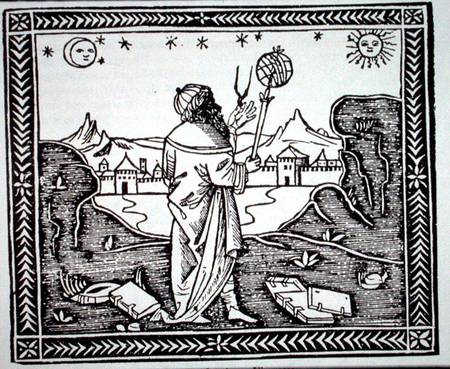 |
| Abu Ma'shar, from his Introduction to Astronomy |
Abu Ma'shar was of particular interest to Western Europe because he was a source for knowledge of and commentary on Aristotle when his writings reached Europe in the 12th century, brought back by the Crusaders. He offered so much more, however. His work blends knowledge of Greek science with Islamic doctrine, Persian chronology, Mesopotamian astrology, and hermetic traditions from Anatolia. He presented a unified approach to the knowledge of several cultures that lent weight to his work.
For instance, he uses the Biblical Flood as the focal point of his astrological tables. He calculates it at midnight on Thursday to Friday, 17-18 February 3101 BC. This date was not arbitrary, nor was it an indication that Abu Ma'shar believed in a short-lived Earth. He chooses the date because it is the start of the Hindu Kali Yuga (the "age of vice"; the last of four phases the world will go through). His knowledge and acceptance of Hindu chronology and its "Great Year" (composed of 360,000 years) is further shown when he calculated a grand conjunction of planets in 183,101 BC, and again in 176,899 BCE.
The Middle Ages loved "unified theories" that could reconcile different traditions to enhance understanding. Abu Ma'shar argued for the superiority of his chronological calculations because he made the year out to be 365.259 days long. Why was he so enamored of this number? Because "259" he explained was the minimum number of days for human gestation (8.6 months). It was obvious to him that he was onto something!
Unlike the hostility experienced by astrology from the University of Paris and others, who felt it was a way to contravene God's plan, or to know what should remain unknowable, Abu Ma'shar was able to give his astrology a veneer of respectability by acknowledging Islamic religious doctrine.